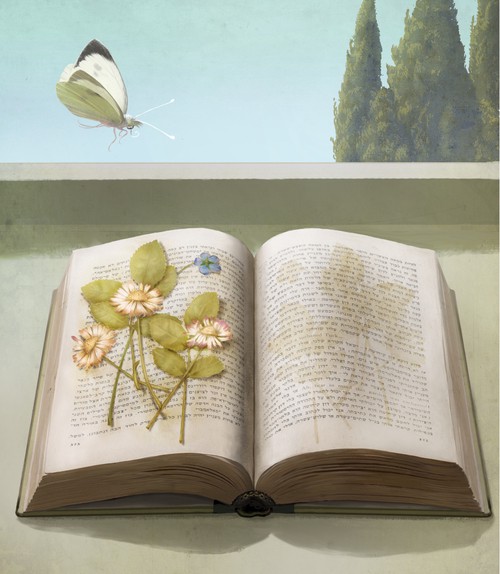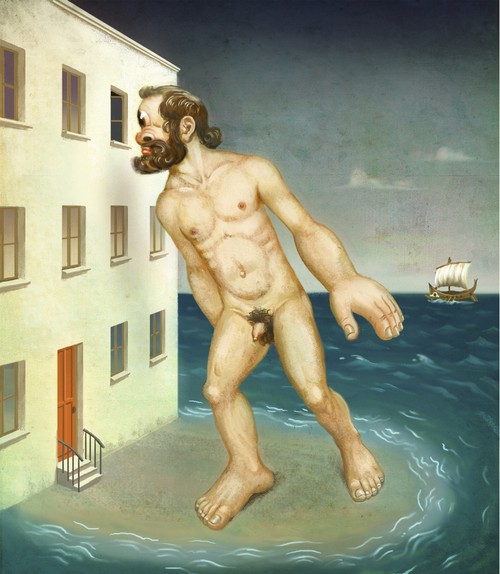Lit Mags
Seven Stories
From Alex Epstein’s FOR MY NEXT ILLUSION I WILL USE WINGS

EDITOR’S NOTE by Benjamin Samuel
While the word counts of Alex Epstein’s “microfictions” may rarely reach triple digits, the seven stories this week, from his new collection, For My Next Illusion I Will Use Wings, occupy the space of something much larger.
In these stories, translated from the Hebrew by Jessica Cohen, as in all his writing, Alex performs an act of distillation, capturing the very essence of fiction. His stories are so poignant they penetrate, resonate, and are certain to leave a profound impression. Alex’s writing often features figures from science, mythology, history, and literature; he writes about Kafka and language, Odysseus and the passage of time, love and technology. And it is in these seemingly familiar, outsized elements that we see ourselves reflected.
In the first story of Alex’s earlier collection Blue Has No South (2010), Karl Jung gives his mistress a watch without a minute hand, a watch that “measures the time of love.” It seems time moves differently for each of us: it drags, it flies, it slips by, it slows, and is gone before we know it. We cherish our time, yet we spend afternoons killing it. As in life, in Alex’s stories, time is relative. A lifetime is compressed to a few sentences, or a single moment expands into a lifetime.
Alex’s stories are short, remarkably short. In comparison, even flash fiction feels decadent. But his writing isn’t an exercise in Oulipian restraint, or an effort to craft Twitter-friendly fiction — although Alex often tweets his stories, and once experimented with Facebook publishing — it’s what comes naturally. Alex told me it took him ten years — during which time he wrote three novels — to discover that for him “extreme brevity was the right filter.” For Alex, microfiction is “the most genuine literature format of our era, the combination of the fact that everything can change with a blink of the eye, but at the same time remain as it always was.”
The refined nature of these stories is so unusual, so remarkable, that we’re departing from Recommended Reading’s normal publication schedule. Instead of one story a week, starting October 10, we’re publishing one microfiction a day for seven days, each accompanied by a beautiful illustration by David Polonsky. Later, they’ll all be available together online, and in Kindle and ePub formats. But, as Alex recently expressed in an email, “The reader is always smarter than the writer, and he will figure out the best way to read the text.” However you encounter these stories, we encourage you to share them, to spend time with them, to let them, however briefly, take you someplace new.
Now, as Alex once wrote, “It’s your turn to find an alibi for the imagination.”
Benjamin Samuel
Co-Editor, Recommended Reading
Seven Stories
Alex Epstein
Share article
Final Nightmares

In his old age, the time traveler went back to die in his parents’ bedroom.
A Quiet Legend

Every morning, the last man in the world went into a second-hand bookstore, where he sat and read. From time to time he marked a page by folding down its corner.
Book Perfume

I heard tell of a king from a southern kingdom, who commanded his alchemists to concoct a perfume that would smell exactly like old books. The alchemists rejoiced: At last! A simpler task than distilling gold out of urine! They began to work day and night, destroying books and burning covers and crumbling pages. They achieved some good results, and almost discovered penicillin on the way. But one night, as in all legends, the king suffocated in his sleep and died. His beloved son, heir to the throne, immediately gave orders for a deep grave to be dug for his father in the heart of the desert, where he would be buried with all of his wives and his servants and his books and his camels. One of the alchemists had written the final formula for the perfume in the margins of a book that was also tossed into the grave. And other storytellers add that the sand, as it is wont to do for both great and small, covered it all.
Plot Twist

Due to a tiny crack in the time-space continuum, E. received a remarkably polite rejection letter from a publisher for a novel he had not written. He threw the letter in the trash and forgot about it. A few days later another one arrived, from a different publisher, with lavish praise for the imagination and style, followed by a sincere apology for the novel being “unsuited to this publisher’s overall line.” And then another one. E. noticed that his wife sometimes came home late from work, claiming things were busy at the office. One evening he switched on all the electrical appliances in the house, and the bulb in the closet burnt out. His wife started turning off her cell phone in the afternoons. He repeated the experiment with the bulb a few more times. On the coat rack next to the front door he found a scarf he did not remember she had. The letters kept arriving. This went on month after month. Finally, he gave in and bought a typewriter at a secondhand shop.
Bereavement

Her parents reminisce: as a child, instead of using a bookmark, she would write in books with a marker: “I’m here.” “I’m here.” “I’m here.”
On Elderly Poets (and Love)

At the age of seventy-seven, after another stroke, he wrote his wife a poem he could not remember if he had already written when he was thirty. Either way, love is merely a crease in the present time.
Anti-Odyssey

And it happens this way too: A man walked out of his apartment, but turned back after a few steps to make sure he hadn’t forgotten to lock the door, and then he stepped into the elevator and went down and wondered whether, while checking if his door was locked, he might have turned the key the wrong way, thereby in fact opening it, so he went back up to make sure, and when he finally managed to get out onto the street he discovered that it had started to rain and he had no umbrella. He went back to his apartment, locked the door from the inside, closed all the windows, shoved a rag under the door and turned on the gas.








